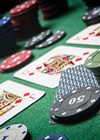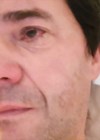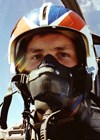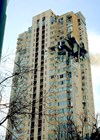I have always been captivated by a true-life story demonstrating the human spirit of triumph over adversity. For me, one of the most memorable sportsmen overcoming an injury has always been the mountaineer Joe Simpson and his tale of survival after falling down a crevasse with a broken leg whilst climbing the Siula Grande mountain in the Peruvian Andes, narrated in his book, Touching The Void (1988).
Recently however, I became aware of another story about a sportsman’s courage and determination to overcome an injury, described by the fly-half international rugby player Ian McKinley in his recently published autobiography, Second Sight. I connected with Ian through David Lockington, Eye News’ co-editor, and we met virtually around midsummer 2023.
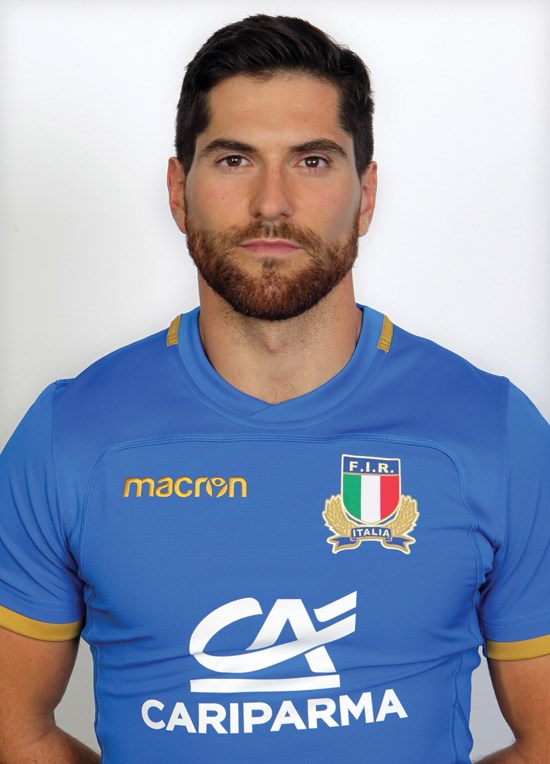
Ian McKinley. Image: ©DanieleResini/Fotosportit
Ian grew up in a vicarage in Whitechurch, a small suburban area on the south side of Dublin at the foothills of the picturesque Wicklow mountains, with his dad Horace, the Rector, his mum Pam and his three older siblings, Andrew, Emma and Philip. As a child, Ian was heavily sports orientated and confirmed that he was not a bad student, “but I was never going to be getting As or Bs.” Attached to the vicarage there was “about an acre of ground that I was able to kick a ball around, and that was the only thing that interested me, if I’m to be honest”. He initially started playing hockey, which was followed by Gaelic football, but rugby did not feature early on because for kids this was usually played on a Sunday morning, which clashed with attending church.
It wasn’t until Ian attended St. Columba’s High School that things really took off with rugby, although he added “the school has more of a reputation for producing ophthalmologists than rugby players. It provides a good well-rounded education, but you wouldn’t necessarily go there for sporting excellence”. Towards the end of high school in the summer of 2007, he dropped hockey and Gaelic football to focus on becoming a professional rugby player and by the following spring, was playing for the Irish Under-19 squad. In the summer of 2008, he was en route to fulfilling his dream when he was accepted into the Leinster academy, one of the four professional rugby union teams in Ireland, and purportedly the best club team in the world.
"Even though I would do literally anything for the sport, it can be cruel, and you have to make logical decisions because you still have the rest of your life to live"
By the second year at the academy, Ian was flying high and starting games for the Leinster seniors, the University College Dublin (UCD) seniors and Ireland Under-20s. However, midway through the season on 16 January 2010, when playing in a local derby match for UCD against Lansdowne, disaster struck.
Within the first five minutes, UCD were attacking the Lansdowne 10-metre line when Ian described finding himself “grappling for possession with another guy at the bottom of a ruck. I was on my back for honestly a split second and felt this almighty thud in my face. Those were the days when you could still ruck a little bit, not like nowadays, and you know the difference between a ruck and a stamp, and this stamp was literally straight down on my face. For me it felt very intentional and deliberate and there was a small fight that broke out but nothing too major.”
The team physio and doctor both then came on to examine Ian and immediately brought him to the side. It was quickly established that Ian had an eye injury, and he was rushed to St. Vincent’s University Hospital where he was assessed and found to have a ruptured left globe. It was here that he began to understand the seriousness of the situation when he looked in the mirror to see that “the eye was skewed and grey and looked really bizarre.”
He was subsequently transferred to the Royal Victoria Eye and Ear Hospital where it dawned on him that he was really not in a good state when the trainee on-call doctor came to see him and “she took one look at the eye and acted very well, but you knew that this was way above what her training had prepared her for.” The Cornea and Refractive Surgery Specialist Professor Billy Power was paged to come in and help with the globe repair which lasted for four hours, and the following day Ian was informed that it had all gone as well as could have been expected.
Following surgery Ian was keen to get back to training as soon as possible. However, as part of the convalescence period, he was required to stop all exercise for a prolonged period which he found very difficult. He explained that “the hardest thing was going from a hundred to zero. Normally when you tear an anterior cruciate ligament (ACL) or dislocate a shoulder there is a rest period, but there is then something else that you can be doing. For me there was a complete stop for the foreseeable future, and it only takes a few weeks for the vast majority of your fitness and a lot of the work you have been doing to diminish. That was hugely frustrating.”
The vision in Ian’s left eye gradually improved and after about four months, Ian estimated that he recovered approximately 50% of the central vision in the eye and was unaware of any problem with the peripheral vision. It was at this stage that he went back to light training. He finally returned to play competitive rugby in August 2010 and a little over a year after the injury in February 2011, resumed playing rugby matches for Leinster. The happiness was short-lived though as in the May, soon after being awarded his first senior contract at Leinster, he noticed during a game that the vision in his left eye had deteriorated. As Ian described: “my whole world was about to be shattered.”
Further examination by Prof Power revealed that a cataract had developed which was promptly operated on. However, following surgery, Ian’s vision failed to improve, and it was found that the retina had subsequently detached. Surgical repair was ultimately unsuccessful, leaving him with a painful, blind left eye. He then made the difficult decision to retire from competitive rugby for three reasons: the pain in the eye, the loss of depth perception and the lack of eye protection.
Although he knew that the pain would probably settle, it seemed inconceivable for him to be able to continue and play in a safe environment particularly as he was on the receiving end of eye gouging incidents by opposing players on his return to rugby. He explained: “Even though I would do literally anything for the sport, it can be cruel, and you have to make logical decisions because you still have the rest of your life to live. To this day, that was the hardest thing I have had to do. It was like a bereavement.”
The following year, a serendipitous event changed Ian’s path through life yet again. He was contacted by his former academy manager, Collie McEntee, to ask if he would like to coach rugby in Udine, Italy. He told me, “I wasn’t actively looking to move abroad, but when it came about, I couldn’t have been happier. The rugby community is just so small compared to other sports such as American football or football, and the hub of Irish rugby is in Dublin which is where I’m from. You would go out to bars and people would say ‘I played against you, you were brilliant’, and as kind as that is, […] just get me somewhere that no one knows anything about me. It was a chance to discover what rugby in a different country is like and also how to grow up. It was just the perfect opportunity, the perfect time and it seemed to tick every box.”
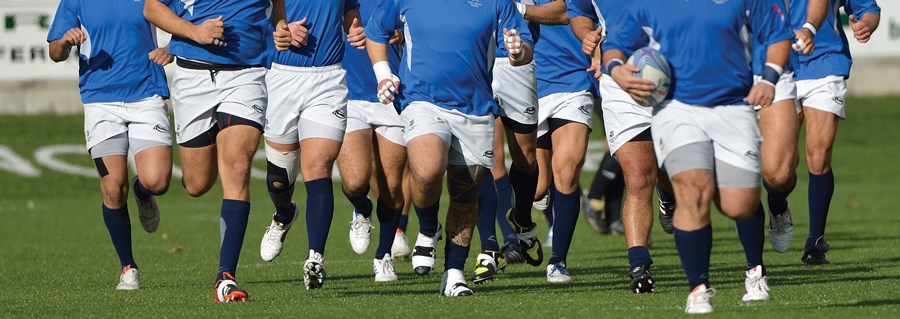
So, in August 2012 Ian headed to Italy to start coaching for Leonorso Rugby Club in Udine, near the Dolomite mountains and close to the borders of Slovenia and Austria. As a coping mechanism for the abrupt ending to his playing career, he immersed himself into his work and became intensely busy not only coaching for Leonorso but also teaching rugby and English in local schools and signing up for an Italian language course at the University of Udine. Despite this new start and a flourishing career in coaching, deep down Ian was still unhappy and struggled to come to terms with the fact that his rugby playing days appeared to be over. Regularly flicking through the rugby match results on his phone to be reminded of former teammates successes did not help the situation.
Things were to come to a head when Ian’s brother Philp paid a visit to Udine in April 2013, and this would bring about another major turning point in Ian’s journey. The sequence of events all started on a day trip by train to the beautiful port city of Trieste on the Adriatic Sea, and as Ian explained, “this was to be the biggest event in my life, because if it didn’t happen, who knows how the story might have finished. I certainly wouldn’t be at peace with myself or the sport.”
”On the train journey Ian was already in a bad mood having seen that many of his former teammates had achieved a resounding victory for Leinster over Wasps (48-28). As they explored the sights of Trieste, Philip sensed Ian’s lack of enthusiasm and his snappy demeanour. Later, as they walked up to Castello di San Giusto, on turning to his brother, Ian suddenly welled up with tears. With the subsequent outpouring of emotion, Philip realised how truly unhappy Ian was. Ian isn’t quite sure why he broke down that day, “but thank God I did, because if you ever need something resolved or fighting the good fight for the right reasons, then my brother is that person.”
Following his return to Ireland, Philip put his thinking cap on as to how he could help Ian fulfil his desire of returning to playing rugby, which would ultimately require the use of eye protection. Ian described how Philip set the ball in motion by sending him through information about visually impaired or goggle wearing athletes including football players like Edgar Davids, and American football players, ice hockey players and wrestlers. The issue was that although World Rugby had eye protection in place for players under 18, they didn’t have anything for seniors. As Ian explained, “It was something that they were looking at, but it was very much low down in their list of priorities because as you can imagine concussion is the biggest issue that they need to address. So, we knew that we had to be fairly bullish in our approach with World Rugby in order to get things done.”
Fortunately, the offices for World Rugby were located in Dublin, which meant that Philip could visit as often as he needed, and Ian flew back from Italy several times to find out if protective goggles were a realistic target – if they were in production and if they were readily available. They eventually ascertained that a manufacturing company, Raleri, located in Bologna, Italy, had an agreement with World Rugby to trial goggles. “So, we had a situation where the head offices were in Dublin, where we talked about the legality and insurance, and the making of the goggles was happening only four hours from where I was living. It was almost as if the stars were aligned.”
Ian described facing off-field challenges much harder than on-field ones. “I say this very lightly, but learning how to catch again, to tackle properly, to defend, to evade, to kick because I am left footed and can’t see out of my left eye, were all easier than the off-field stuff. The goggle issue was not deemed important for World Rugby and so there were all these barriers put up which only made us more determined, and everyone loves a David versus Goliath story.”
With a great deal of determination, the goggles were finally approved, and after almost three years off the pitch he returned to competitive rugby in March 2014, with his first game playing in the lowest Serie C regional division for Leonorso against Oderzo, which they won 65-5 and Ian scoring 28 points. I asked Ian how it felt returning again and he uses an ophthalmology analogy, saying: “It would be like going from doing a cataract operation in the most expensive and luxurious private practice clinic to then performing it out in your back shed. Even though the circumstances and structures around were not there, I was just so happy being able to do it and complete it which took a huge effort.”
Not only did Ian have to manage the vagaries of the weather, where rain and mud on the goggles would reduce visibility, but both floodlights at night and bright sunlight would cause issues with glare. Despite all this, with practice and training, he started climbing through the ranks and was eventually signed by the prestigious Italian side Benetton in 2016. He eventually fulfilled his childhood ambition of playing international rugby in 2017, which was for Italy due to the three-year residency rule in place.
Ian earnt his first international cap playing for Italy against Fiji in the November of that year and described it as the highlight of his career. Before the match, Ian’s childhood hero, the Italian rugby icon considered to be the greatest Italian player of all time, Number 8 Sergio Parisse, presented Ian with his jersey and said, “utmost respect for you”, which was an inspiring moment for him. Italy won the game 19-10 and with a perfectly scripted ending to the match; Ian scored with the last goal kick and his first ever international points sealed the win.
"The goggle issue was not deemed important for World Rugby and so there were all these barriers put up which only made us more determined, and everyone loves a David versus Goliath story"
Ian continued playing fly-half for Benetton and Italy until 2020, when at the start of the pandemic, he made the decision to retire from competitive rugby as he wanted to stop at the top of his game. I asked Ian if he felt happy that he achieved everything he wanted to in rugby despite the eye injury and he replied: “If you were to ask Roger Federer if he is happy with 20 Grand Slams, I’m sure there is a big part of him going ‘Yes’ and a bigger part going ‘No’ because there are people that are ahead of him. I think that’s just built into sporting people. You always want more but you’ll be grateful for what you have. When I say I am at peace with rugby now, it’s because I got to experience it to the full in those six years, as a contracted player and playing international rugby. If I didn’t get to experience that, I wouldn’t be an upbeat person and that’s why I’ll always be indebted to my family and my brother Philip in particular.” His only regret is that he never mastered kicking with one eye which he found particularly challenging.
Ian told me that he now works as a sales rep selling ophthalmic instruments, “so if you need anything just let me know”, and still coaches rugby for a local country club, Rainey Old Boys, in Magherafelt, Northern Ireland. In the future he would love to coach professional rugby, but right now is enjoying family life with his wife Cordelia and son Malachy.
I asked Ian if he had any advice for life and he said that it comes from his brother Philip in the Netflix documentary film Look Beyond, which narrates Ian’s eye injury and rugby career. In the film, Philip says “family is everything”. Ian continued, “It really is, making sure that you have a group of people or a singular person that you can really rely on. Surround yourself with good people.”
His further counsel is: “Don’t give up. If you really want to achieve something you certainly need to have talent, you need to have help and you need to have a drive. And don’t be afraid to ask for help. If you want something enough, you’ll do whatever you can to get it. For me I wanted to realise the dream of playing international rugby and a burst eyeball was not going to stop me.”
His advice for any aspiring professional rugby player is to stay off social media, which he believes is a golden rule. From an amateur perspective it is just to be involved in the game because since the COVID-19 pandemic there has been a drop off in playing numbers. “The sport is very unique in that there are such grounded people in rugby clubs, and that is just the spirit and essence of the game that I hope doesn’t go away. Rugby in terms of a team sport is really wonderful to be a part of.”
Throughout our discussion Ian’s love for the game shone through. His story of returning from a devastating eye injury against all the odds to competitive rugby and performing at the highest level in the international arena is truly inspirational. He also leaves a legacy for visually impaired rugby players, with thousands of people having benefitted from the protective goggles which he pioneered, and he is still actively involved in the visually impaired game. As we signed off before Ian’s evening rugby training, he left me with these final words: “I’m a firm believer that you make your own luck in life and if you keep doing the right thing – and it might be in a year or even in 10 years – then something good will happen.”
COMMENTS ARE WELCOME




